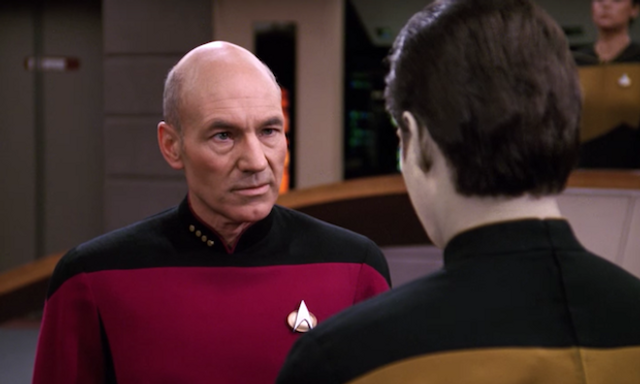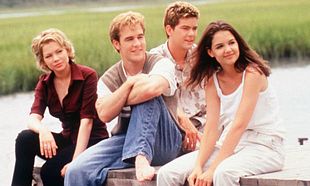Since its inception, 'Star Trek' has been credited with predicting the future in a variety of ways.
The original series was ahead of its time in having a multi-ethnic cast on prime-time television, the technology showcased became an inspiration to engineers and designers and the idea that humanity would eventually leave behind violence, hatred and bigotry is one that we're still working on.
'Star Trek' was always aspirational, of course, and Gene Roddenberry made no secret of that fact. Yet, here we are in 2019 and a lot of the technology that 'Star Trek' predicted has come to reality.
'Star Trek: The Next Generation', which followed the original series and began in 1987, had a similarly aspirational message to it. However, more than a few episodes dealt with the realities of our time and one particular episode - Season 3's 'The High Ground' - hit particularly close to home. The episode saw the Enterprise in orbit above an idyllic planet that was the subject of a centuries-long civil war.
Dr. Crusher, the ship's medical officer, is taken hostage by terrorists who bombed a café where she and other members of the Enterprise were relaxing. As Captain Picard attempts to negotiate a release for Dr. Crusher, the local government begins brutal interrogation of suspected terrorist collaborators - much to the horror of the crew of the Enterprise.
One key scene in the episode sees Data, played by Brent Spiner, discussing the pros and cons of terrorism with Captain Picard, played by Patrick Stewart. The scene itself discusses a time when terrorism has actually achieved its aim and Data makes a pointed reference to a United Ireland that happens in 2024 and other, real-life events where terrorism eventually won out. Captain Picard, with his usual stoicism and logic, replies that that's a question mankind has struggled with for centuries.
Here's the scene in question.
Interestingly enough, the episode itself is intensely disliked by the series' writers. Ronald D. Moore, who is currently the showrunner for Outlander which stars Irish actress Caitriona Balfe, described the episode as "our one terrorist show" in an interview from 1995.
"We didn't have anything interesting to say about terrorism except that it's bad and Beverly gets kidnapped – ho hum. They take her down to the caves and we get to have nice, big preachy speeches about terrorism and freedom, fighting and security forces versus society. It's a very unsatisfying episode and the staff wasn't really happy with it."
Indeed, when we asked Brent Spiner about the episode, the actor freely admitted that he had forgotten entirely about the scene in question.
Yet, for all the misgivings with the episode itself, it had an impact and certainly proved controversial at the time of broadcast.
So much so, in fact, that the BBC specifically pulled the episode on its first-run transmission in 1990. The episode wasn't shown on the BBC unedited until 2007. Meanwhile, Sky One showed the episode - with the above scene conspicuously edited out - and later aired the episode in full without edits. RTE, which showed 'Star Trek: The Next Generation' for a time, has reportedly never screened the episode in question.
This wouldn't be the first time that Northern Ireland would feature in 'Star Trek', as it was referenced - albeit in an allegorical manner - in 'Deep Space Nine', the series which followed 'The Next Generation'.
Ira Steven Behr, one of the showrunners involved with 'Deep Space Nine' discussed in an interview how the show's setting - a space station above a planet that was previously invaded and colonised, with former terrorists / freedom-fighters now serving as crew members - was partially influenced by them. "Obviously, this was in the '90s," explained Behr, "so there was the Middle Eastern conflict, Lebanon was a big hot topic, tons of things, the Northern Ireland thing came up too, so I would say it's not based on any of them and it's based on all of them."
Although we're still a long way away from warp technology and talking, fully-autonomous androids, the prospect of a United Ireland could be a reality in the face of a changing political landscape in the North and as an unexpected consequence of brexit. However, where reality differs from 'Star Trek: The Next Generation' is that it'll be carried out via political means as opposed to terrorism.









































































